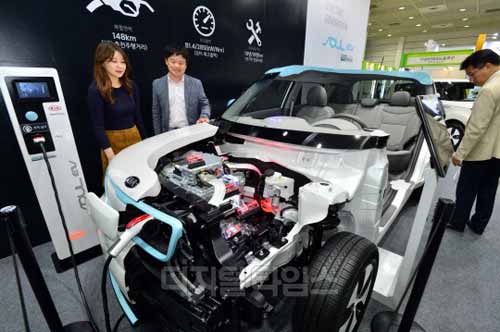China to recycle used battery of EV… Korea in hesitation
Park Jung Il | comja77@ | 2018-03-06 10:35:10

According to China`s securities network and industry on March 5, seven ministries including China`s Ministry of Industry and Information, Ministry of Science and Technology, Ministry of Environment and Energy and Ministry of Energy said on February 26 (local time) Action.
The key to this action is that automakers are responsible for establishing a battery recycling and recycling network. In addition, it is necessary to share battery disassembly, storage technology, location of service stores, and new energy car recovery information in cooperation with the collection and decommissioning of scrapped vehicles.
The Chinese government will also set up related industrial funds and research institutes with social capital to build a virtuous cycle battery recycling system with market competitiveness, he added.
Meanwhile, the industry has said that China has been pushing for a waste battery recycling policy as well as environmental reasons as well as economic reasons for the surge in battery material prices.
According to the industry, China`s lithium reserves account for 20% of the world`s total, but consumption accounts for 40% of the global market. China`s state-run battery companies are investing in equity in foreign lithium mines such as Australia and Argentina to meet their growing demand. Electric vehicles sold in China last year accounted for 472,000 units, accounting for 45% of global electric vehicle sales.
On the other hand, the domestic situation, which relies on imports of all the battery materials such as lithium, is worse. However, our government has not yet prepared a recycling plan for electric cars. Currently, electric vehicles purchased with subsidies from the government and municipalities return cars to the local governments at the time of the scrapping, but it is not easy for local governments to recycle them.
Some battery makers have suggested that electric storage devices (ESS) should be made from recycled batteries when they are used in electric cars. In fact, Jeju Island is working on building an infrastructure to recycle waste battery reuse centers for electric vehicles by the end of this year. Theoretically, an electric vehicle battery can maintain 70 ~ 80% of its original performance even if it runs over 100,000 km.
However, the central government, which has been discussing it for over a year, has yet to come to a conclusion. Hee Se-jin, a Senior Specialist at the Korea Productivity Center, attended the `Forum for Improving the Circulation of Waste Battery Resources in Electric Vehicles` held at the National Assembly on December 12, saying, "Any ministry including the Ministry of Environment, Ministry of Land, "Even if a certification body is established, there is no standard, role, or function, so we should start discussing it from now on." In response, the Ministry of Environment announced that it plans to announce plans for recycling waste batteries of electric cars through gathering of discussion and industry opinions, and to create an institutional basis for rare resource extraction or ESS recycling.
By Park Jung Il comja77@
